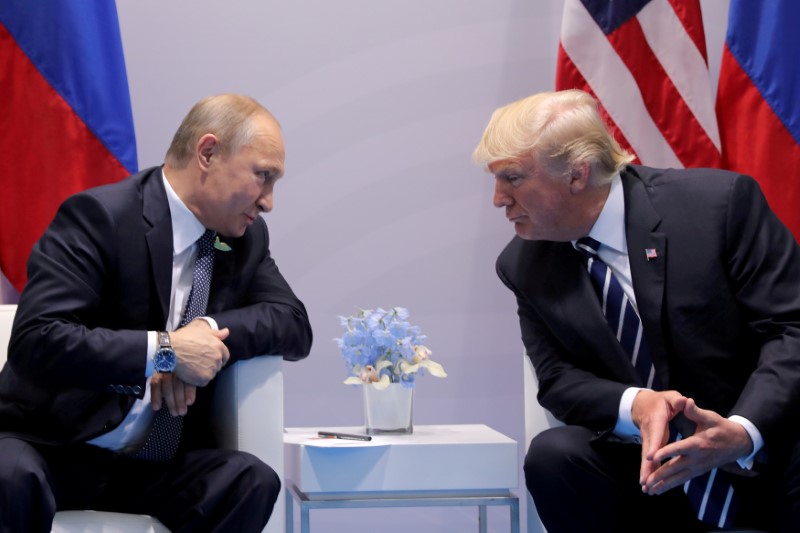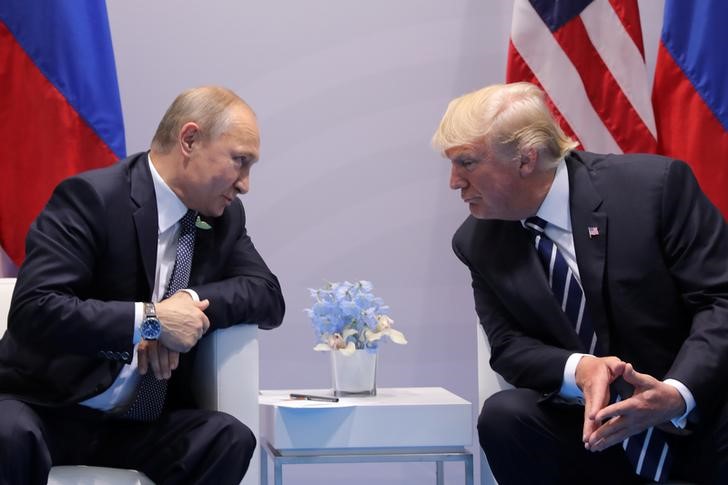MOSCOW/WASHINGTON (Reuters) - Donald Trump and Vladimir Putin will sit down in a room together in the Finnish capital on July 16 for their first summit meeting.
The U.S. president's spontaneous approach to negotiations, and the inscrutable style of the Kremlin leader, make predicting the outcome of the summit with any accuracy close to impossible.
We do however, have a reasonable idea of the issues the two leaders and their aides will have mapped out before the meeting: the areas where they each want something from their counterpart, and the places they are willing to give ground.
Below are the issues likely to figure:
ARMS RACE RHETORIC
Both Trump and Putin have been using bellicose rhetoric about their nuclear arsenals, drawing their countries closer to a new arms race. Trump has said the U.S. nuclear capability needs renewing. He told Reuters last year, "if countries are going to have nukes, we’re going to be at the top of the pack." Putin in March this year unveiled an array of new nuclear weapons, and warned Western governments "now they need to take account of a new reality." An arms race would be dangerous and expensive for both sides. An agreement to scale back the rhetoric would be a win for both Putin and Trump. Progress towards extending the New Start arms treaty, which expires in 2021, would give substance to that agreement.
SANCTIONS RELIEF
Putin would like Trump to soften sanctions that Washington imposed over the annexation of Ukraine's Crimea region and backing for separatists in eastern Ukraine, involvement in the Syrian civil war and allegations of Russian meddling in the U.S. elections in 2016. While a 2017 law bars Trump from easing many sanctions without Congress’ approval, he can offer some relief without a nod from Congress. The Republican president, who did not want to sign the law and has missed several deadlines for imposing sanctions included in it, could send a signal that the administration does not plan to expand the list of Russian firms and individuals subject to economic and travel restrictions. That would unfreeze much-needed investment and lending from international investors who, at the moment, are reluctant to commit to Russia for fear of the sanctions’ impact.
SYRIAN DEAL
Washington ally Israel is anxious that, with the conflict in Syria entering its end game, Iranian and Iran-backed forces will be left gathered around Israel's borders. At the summit, Trump may ask Putin, the most powerful outside player in Syria since Russia's military intervention there, to use his influence with Tehran to curb Iran's military presence. This would be tough to deliver for Putin: it would risk a rupture with his allies in Tehran, and could leave Russian forces having to do the lion's share of the remaining fighting in Syria, a burden that Moscow does not want to shoulder.
DIPLOMATIC TIT-FOR-TAT
Russia's diplomatic presence in the United States, and the U.S. missions in Russia, are depleted after two rounds of tit-for-tat diplomatic expulsions in the past two years. The first was over alleged Russian meddling in the U.S. election, and the second, this year, was in response to the poisoning in England of former Russian spy Sergei Skripal and his daughter. Putin and Trump could agree in Helsinki to restore the full complement of diplomatic staff. That would not change the substance of the U.S.-Russia relationship, but it would be a symbol of a new start.
RUSSIA'S BACKYARD
Since Russia's annexation of Crimea in 2014, the NATO alliance has stepped up military exercises in eastern Europe. The aim, according to NATO leaders, is to reassure alliance members who fear a Russian incursion. That has angered Russia. It says NATO is bearing down on its backyard. The Kremlin has likened it to Russia stationing missiles in Mexico. If Trump scaled back the exercises, that would be a big win for Putin. Two senior NATO diplomats told Reuters they are prepared for a worst-case scenario that Trump would announce a freeze on U.S. military exercises or withdraw troops from the Baltics in a gesture to Putin. At the NATO summit in Brussels that precedes Helsinki, NATO states will seek Trump's assurances that he will stand firm on the exercises.
UKRAINIAN ALLY

Washington has stood by Ukraine's pro-Western leaders in their stand-off with Russia. That has included the United States providing Kiev with hundreds of millions of dollars worth of military aid. Helsinki would be a triumph for Putin if he persuaded Trump to drop that military aid. Ukrainian officials say they have assurances from Trump aides he won't do this, but acknowledge anything can happen when Trump and Putin are in a room together. In return, the Russian leader could make concessions over eastern Ukraine, where pro-Moscow separatists control swathes of territory. Diplomats say there is a deal to be done allowing armed international peacekeepers to patrol the area. However, Putin will not contemplate any concessions over Crimea.
